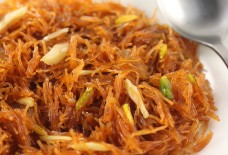Why did the Arab Spring Begin in Tunisia?
SOURCE: THE INDIAN EXPRESS
BY: H.E. KHEMAIES JHINAOUI
The radical change that took place in Tunisia in January 2011, that the rest of the world calls the “spark that lit the movement for democratic reform across the Arab world,” would never have happened without the strong determination and courage of the people of Tunisia. This peaceful and civilized uprising for dignity, freedom and democracy was unprecedented and was applauded and praised by the whole world.
Yet, to this day, the question, “Why Tunisia succeeded?” is being answered in very different ways by scholars, researchers and commentators. For some, Tunisia was just a lucky country, a homogeneous and united nation, both developed and highly literate, with a strong labor union, active civic associations, and professional groups. Others see the foresight of Tunisia’s political leaders, the moderation of its Islamists, and the respect by its military for civilian institutions as crucial factors for Tunisia’s transition success.
But the fact, is that there is no secret to Tunisia’s peaceful transition success. Inclusive dialogue, consensus, and the strong commitment and determination of the Tunisian people to build a better future were the magic formula. For us the answer is very simple: It was absolutely clear from the beginning that the political elite, secular and Islamist, were deeply committed to meet the aspirations of the Tunisian people through the establishment of solid democratic institutions. As the great Mahatma Gandhi said once: “The Future depends on what you do today”.
Nevertheless, the reformist tradition deeply rooted in the Tunisian society that goes back to the beginning of the 19th century, the largely educated youth, the unique status for women, and the largely middle class, were also key ingredients for the success of the transition process. Indeed, since its independence, Tunisia evolved into a politically tolerant and progressive country. Under the leadership of late Habib Bourguiba, who led the national movement of independence, the country became a showcase for development, moderation, and openness with a far-reaching policy of gender equality as well as an ambitious education program.
Thanks to dialogue and consensus, the Tunisian people made history again in 2014, by adopting a new progressive constitution that paved the way for free and fair parliamentary and presidential elections. A historical achievement that granted the Tunisian National Dialogue Quartet the prestigious Nobel Peace Prize in 2015.
As any young emerging democracy, today Tunisia is facing significant challenges that the Government of National Unity is working to tackle to meet the aspirations of the Tunisian people for prosperity and progress. We are confident that with the strong determination of the Tunisian people and government, the leadership of President Beji Caid Essebsi and the precious support of friendly countries like India, Tunisia will be able to continue on the path of reforms and fully complete its democratic transition.
My return to Incredible India, a country that I deeply admire and passionately love, over 30 years after I finished my first diplomatic assignment, to co-chair with Her Excellency Mrs Sushma Swaraj, Minister of External Affairs, the 12th Session of the Tunisia-India Joint Committee Meeting to be held today, on October 30 in New Delhi, is yet another opportunity to further boost our bilateral engagement both at the political leadership and official levels and to give a new dimension to our friendship and cooperation.
Our vision is to build on the momentum of the achievements of previous years and establish a new, bold and transformative agenda to further broaden our partnership in key areas and sectors of shared interest, including trade, investment promotion, finance, education, IT, research and innovation, security, agriculture, cyber-security, energy, renewable energy, pharmaceuticals, skills development, tourism, sciences and technology, and health.
We will also closely collaborate to develop and strengthen our collaboration in the security field to effectively deal with today’s threats, such as terrorism, radicalism and extremism, both bilaterally and multilaterally. Like India, Tunisia has “zero tolerance” towards terror and violence and strongly condemns terrorism in all its form and manifestations.
Today, no nation and no state is immune from the threat of terrorism. And however rich or powerful, no single country can defeat terror alone or face the current challenges posed today by a phenomenon with links beyond the borders.
Joining the international coalition against ISIS is part of our country’s contribution to regional and international efforts to effectively fight terrorism and extremism. Defeating terrorism and criminal entities such as ISIS is today a high priority for the international community in order to help bring a lasting peace, and stability and security cross the globe.
I take this opportunity to reiterate our deepest gratitude to the Republic of India and to the Indian people for their longstanding friendship and constant support to Tunisia during this critical time of its history.









